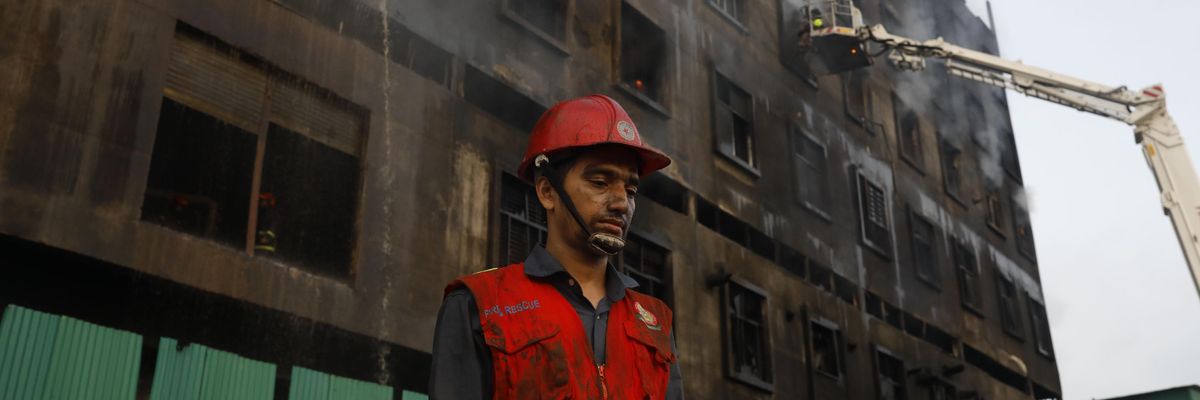A massive fire engulfed a food processing factory overnight in Bangladesh, killing more than 50 people and injuring at least 26 more, with additional workers still suspected to be inside the building after being trapped by an illegally locked door, officials said Friday.
After flames erupted Thursday around 5:00 pm local time on the ground floor of the seven-story Hashem Foods and Beverage factory in Rupganj--part of the Narayanganj district located about 12 miles southeast of Dhaka, the nation's capital--firefighters spent the entire night battling the blaze, which was reportedly still burning nearly 24 hours later.
"Three people died from jumping off the building to escape the fire and 49 charred bodies have been recovered so far," Mustain Billah, the administrator for the Narayanganj district, toldReuters by phone from the scene.
While the cause of the fire remains unknown, Billah said that "it is still burning on the top floor. Firefighters are struggling to control it, as chemicals and flammable materials were stored inside the building."
Once most of the fire had been extinguished on Friday afternoon, rescue teams "discovered piles of bodies" inside the building, the Associated Press reported, causing the known death toll to surge from three to 52. According to Debasish Bardhan, deputy director of the Fire Service and Civil Defense, the top two floors of the factory have not yet been searched, meaning that further casualties are likely.
"The main exit of the factory was locked from the inside and many of those who died were trapped," AP reported, citing Bardhan. Abdullah Al Arefin, a district fire service official, corroborated Bardhan's account when speaking with Reuters.
More than two dozen workers sustained injuries while jumping from the upper floors of the factory.
"We rescued 25 people after setting a ladder to the rooftop," Bardhan told Reuters. "We could have saved more if others could reach the rooftop."
Mohammad Saiful, a factory worker who escaped the fire, toldAgence France-Presse that there were dozens of people inside when the fire started.
"On the third floor, gates on both stairwells were closed," said Daiful. "Other colleagues are saying there were 48 people inside. I don't know what happened to them."
According to AP, it is still unclear how many people were in the building and how many are missing. Citing local authorities, the New York Timesreported that "at least 200 people were working in the building when the fire broke out."
"For now, we only have these details," said Bardhan. "After searching the top floors we will be able to get a complete picture."
The Bangladeshi company that runs the factory is a private subsidiary of the multinational Sajeeb Group, which produces juice under Pakistan's Lahore-based Shezan International brand, AP explained. The mango fruit drinks manufactured at the factory are sold in the United States, Australia, Malaysia, Singapore, India, Bhutan, Nepal, and several additional countries in the Middle East and Africa.
"When will factories stop locking in workers in unsafe conditions?" asked Kavita Krishnan, a communist feminist activist and author from India. "When will companies stop outsourcing slavery/sweatshops to Bangladesh, India, Vietnam, etc.?"
Bangladesh, where the inadequate enforcement of safety regulations leaves a highly exploited workforce vulnerable to hazardous conditions, has experienced several industrial disasters over the past decade, including fires that killed workers locked inside factories. Millions of Bangladeshis are employed in the textiles sector, many producing goods widely sold in the West.
The South Asian nation's most deadly workplace disaster in recent memory was the 2013 collapse of the Rana Plaza garment factory outside Dhaka, which claimed the lives of more than 1,100 workers, many of them children.
Progressives around the world have routinely implored the wealthy transnational corporations that exploit the labor of people in Bangladesh and other low-wage countries to prevent future catastrophic incidents by improving working conditions.

